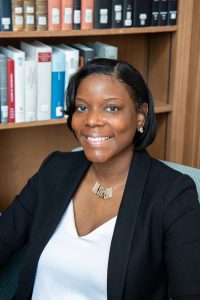
Kimber Thomas holds a two-year appointment at the University Libraries, beginning September 16, 2019, as CLIR Postdoctoral Fellow.
The Council on Library and Information Resources has selected the University Libraries at the University of North Carolina at Chapel Hill to host one of six inaugural postdoctoral fellows for data curation in African American and African studies.
Kimber Thomas will hold the two-year appointment at the University Libraries, beginning September 16, 2019. Her focus will be data curation for African American collections.
CLIR postdoctoral fellowships provide recent Ph.D. recipients the opportunity to develop as scholars while also learning about modern libraries and librarianship. In 2018, CLIR received a grant from the Andrew W. Mellon Foundation to extend its long-running fellowship program to the field of data curation in African American and African studies.
Thomas recently completed her Ph.D. in American studies from the University of North Carolina at Chapel Hill. The title of her dissertation is “The House that Black Built: Black Women, Materiality, and Makeshifting in the Jim Crow South, 1927-1947.” She is a member of the University’s Royster Society of Fellows, which provides stipends and full benefits for five years of study to doctoral students of outstanding promise.
Thomas received her M.A. in African American studies from the University of California, Los Angeles, and a B.A. in English from Alcorn State University in Mississippi.
At the University Libraries, Thomas will be part of the Digital Research Services department and will work with units across the library system to increase the visibility and use of materials relevant to African American studies, including the potential use of these materials as data.
As part of her work, she will develop practices for curating data from the University Libraries’ community-driven archives initiative in ways that meet the needs and goals of community partners. She also will use data from primary sources in her own research projects and by engaging with scholars, using these experiences to inform data curation methods at the University Libraries.


